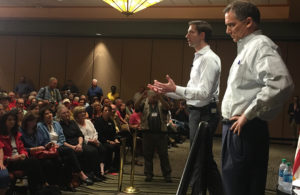
© 2017 by Steve Brawner Communications, Inc.
There’s regular intelligence, and there’s emotional intelligence, which is the ability to recognize and control your own emotions and to influence the emotions of others. If you’re a member of Congress, you need both, but if you’re a member of Congress participating in a town hall, and you can only be blessed with one, it’d better be emotional intelligence.
I write that paragraph after attending Monday’s 2 p.m. raucous town hall hosted by Sen. Tom Cotton and Rep. French Hill, where it didn’t matter what kind of intellectual arguments they made because they weren’t going to change many minds among the 750 attendees – some of whom totally supported them and many of whom were totally opposed. All that mattered was that they kept their cool amongst the booing, jeering, shouted interruptions and personal attacks, and they did.
This is one odd way we do political discourse these days. A Republican congressman – just as Democrats did in 2009 – hosts a town hall for some reason. Advocates alert the like-minded to converge and attack. The member of Congress stands on a stage before a mostly hostile room where audience members take their turns asking questions – most pointed, some insulting, and some better than the ones asked by journalists. Many in the audience cheer. The member of Congress answers – sometimes well, sometimes lamely. Many boo regardless.
That was the case Monday. When Hill said Congress must repeal Obamacare, the crowd reacted with a mixture of loud boos and cheers. Asked if Congress would subpoena President Trump’s tax returns, Cotton said Trump is still being audited, that he has completed a statement of financial interest, and that everyone knows where he does business because he attaches his name to his buildings. Few were convinced. At one point, some audience members chanted, “Lock him up” regarding Trump, an echo of the “Lock her up” chant in the 2016 campaign that Republican politicians unfortunately did little to tame.
The frustration expressed by many in the audience is explainable. All of us have a vision for how this country should look, but, in a democracy of 300 million people, none of us will get our way. Average Americans of all persuasions feel silenced in comparison to big money donors. The system is beset by partisan bickering and is unable to solve problems, even when compromise should be possible. Elected officials inflame the uncivil climate with their own rhetoric. If a politician uses the word “liberal” as an insult, then it should not be surprising that his liberal constituents feel insulted.
Town halls can be useful. They let members of a political minority express themselves in solidarity with kindred spirits. They remind elected officials, who tend to focus on their base of supporters, that some of their constituents feel intensely differently. At their best, they may even expose a member of Congress to new information. I don’t know if it has anything to do with the town halls, but Cotton’s rhetoric on health care has become more balanced after years of his merely criticizing Obamacare. Certainly, I would rather live in a country where average citizens loudly express their disapproval with the authorities than one where such behavior is not tolerated.
But we’ve all learned certain rules for dealing with other people, and those rules shouldn’t change in a town hall setting. Interrupting, shouting insults, putting people on the defensive, speaking without listening – these are not the most effective communication tools. Elected officials, especially polarizing ones like Cotton, know some of their constituents disagree with them, but for every person jeering at them in a town hall, there are hundreds at home or work whose votes cancel theirs out. Some make the calculation that it’s worth being yelled at for an hour or two in order to look like they’re representing everyone. Playing the martyr may even form the basis for a fundraising letter somewhere down the road.
If I were to design these meetings, I’d keep the disagreement and some of the passion, but I’d add a lot more civility to the discourse. I’d have less yelling and jeering, and more shows of hand – importantly, with the expectation that they might actually affect a congressman’s thinking. And I’d have more town halls, period, at accessible times of day.
But then, while all of us have a vision for how this country should look, none of us will get our way. I’ll try to keep my cool about it.
KUDOS! Good, good read!
Thank you, Kathy.